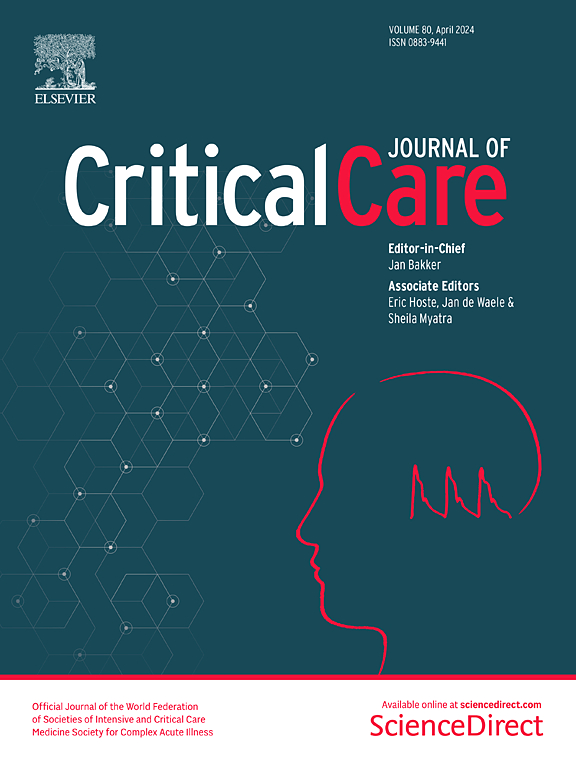Influence of alcohol on in-hospital survival rate among patients with traumatic brain injury: a nationwide cohort study
IF 8.8
1区 医学
Q1 CRITICAL CARE MEDICINE
引用次数: 0
Abstract
The impact of alcohol on the prognosis of patients with traumatic brain injury (TBI) remains unclear. While some reports suggest that alcohol may exert neuroprotective effects, others indicate that it can worsen neurological outcomes. This study aimed to evaluate the influence of alcohol consumption on TBI outcomes using a nationwide database in Japan. We analyzed data from approximately 290 hospitals contributing to the Japan Trauma Data Bank between 2004 and 2018. Patients with head injuries and documented pre-injury alcohol consumption were included. To adjust for potential confounders and institutional clustering, we employed propensity score methods—specifically inverse probability weighting (IPTW) and overlap weighting—and conducted multiple logistic regression with a generalized estimating equation. Covariates in the propensity score model included age, sex, day of the week, time of injury, period of injury, and past medical history. The primary outcome was in-hospital survival. Additionally, we fitted a multivariate logistic regression model (with survival as the outcome) to identify potential interactions and confounders. This model included type of trauma (blunt or penetrating), cause and setting of trauma, head Abbreviated Injury Scale score, multiple trauma status, the Injury Severity Score, and the propensity score. Of the 83,789 patients who met the inclusion criteria, 15,752 had reported alcohol consumption prior to injury (alcohol group) and 68,037 did not (non-alcohol group). In-hospital survival was 91.5% in the alcohol group and 86.4% in the non-alcohol group (risk difference: 5.2%; 95% CI: 4.7–5.7). After adjustment, the alcohol group maintained a higher in-hospital survival rate (IPTW: 92.0% vs. 86.1%, risk difference: 6.2%; 95% CI: 5.9–6.2; overlap weighting: 91.7% vs. 85.4%, risk difference: 7.0%; 95% CI: 6.1–7.8). In the multivariate logistic regression, preinjury alcohol consumption was associated with higher survival (odds ratio: 1.58, 95% CI: 1.47–1.70, p < 0.001). In this nationwide study, preinjury alcohol consumption was associated with higher in-hospital survival among patients with TBI. Further research is warranted to elucidate the underlying mechanisms and confirm these findings in more diverse populations.酒精对脑外伤患者院内存活率的影响:一项全国性队列研究
酒精对创伤性脑损伤(TBI)患者预后的影响尚不清楚。虽然一些报告表明酒精可能发挥神经保护作用,但其他报告表明它会恶化神经系统的结果。本研究旨在利用日本全国数据库评估饮酒对脑外伤结果的影响。我们分析了2004年至2018年间为日本创伤数据库提供服务的约290家医院的数据。包括头部受伤并记录损伤前饮酒的患者。为了调整潜在的混杂因素和机构聚类,我们采用倾向评分方法-特别是逆概率加权(IPTW)和重叠加权-并使用广义估计方程进行多元逻辑回归。倾向评分模型中的协变量包括年龄、性别、星期几、受伤时间、受伤时期和既往病史。主要终点为住院生存率。此外,我们拟合了一个多变量逻辑回归模型(以生存率为结果),以确定潜在的相互作用和混杂因素。该模型包括创伤类型(钝性或穿透性)、创伤原因和创伤环境、头部简易损伤量表评分、多重创伤状态、损伤严重程度评分和倾向评分。在符合纳入标准的83,789例患者中,15,752例在受伤前报告饮酒(饮酒组),68,037例未报告饮酒(非饮酒组)。酒精组和非酒精组的住院生存率分别为91.5%和86.4%(风险差异:5.2%;95% ci: 4.7-5.7)。调整后,酒精组保持较高的住院生存率(IPTW: 92.0% vs. 86.1%,风险差:6.2%;95% ci: 5.9-6.2;重叠权重:91.7% vs. 85.4%,风险差:7.0%;95% ci: 6.1-7.8)。在多因素logistic回归中,损伤前饮酒与较高的生存率相关(优势比:1.58,95% CI: 1.47-1.70, p < 0.001)。在这项全国性的研究中,损伤前饮酒与TBI患者较高的住院生存率相关。需要进一步的研究来阐明潜在的机制,并在更多不同的人群中证实这些发现。
本文章由计算机程序翻译,如有差异,请以英文原文为准。
求助全文
约1分钟内获得全文
求助全文
来源期刊

Critical Care
医学-危重病医学
CiteScore
20.60
自引率
3.30%
发文量
348
审稿时长
1.5 months
期刊介绍:
Critical Care is an esteemed international medical journal that undergoes a rigorous peer-review process to maintain its high quality standards. Its primary objective is to enhance the healthcare services offered to critically ill patients. To achieve this, the journal focuses on gathering, exchanging, disseminating, and endorsing evidence-based information that is highly relevant to intensivists. By doing so, Critical Care seeks to provide a thorough and inclusive examination of the intensive care field.
 求助内容:
求助内容: 应助结果提醒方式:
应助结果提醒方式:


